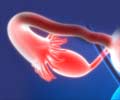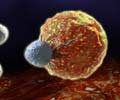A combination of chemotherapy and chimeric antigen receptor (CAR) T cells designed to target the protein HER2 was found to be safe in patients with advanced HER2-positive sarcoma.

TOP INSIGHT
The patients treated on this combination therapy had limited treatment-related toxicities with no decrease in heart functions.
"Our study shows that HER2-targeted CAR T-cell therapy given in combination with lymphodepletion chemotherapy is safe, and though very early, it shows promising antitumor activity in some patients with advanced HER2-positive sarcomas," Navai said.
In this trial, Navai and colleagues treated 10 patients, ages 4 to 54, with refractory/metastatic HER2-positive sarcoma (five with osteosarcoma, three with rhabdomyosarcoma, and one each with Ewing sarcoma and synovial sarcoma). Patients had received up to five prior salvage therapies.
Patients received up to three infusions of HER2-targeted CAR T cells after lymphodepletion with either fludarabine or fludarabine and cyclophosphamide; those who had responses to this initial treatment received up to an additional five infusions of CAR T cells without lymphodepletion.
The investigators found that the CAR T cells expanded in all but two patients with a median peak expansion on day 7, and that they could detect the CAR T cells in all patients six weeks after infusion.
"Some antibodies in this patient's blood were newly detected and maintained after CAR T-cell infusions, suggesting that in addition to the expected direct effect of the CAR T cells targeting HER2 on the tumor, they may have engaged the patient's own immune system," she added. "Further studies are needed to identify the specificities and functional significance of these responses."
Navai noted that overall, the patients on this study had limited treatment-related toxicities. All patients had expected decreases in their blood counts following chemotherapy that subsequently improved, and none developed infections secondary to low blood counts, she added.
"Importantly, no patients experienced decreased heart function, which has been reported with other types of HER2-targeted therapies. We also did not observe any pulmonary toxicities in our patients despite expansion of the infused CAR T cells," Navai said.
A limitation to the study is that this is a small phase I trial, and further testing of the HER2-specific CAR T cells in larger cohorts of patients is warranted to define efficacy and optimal dosage, Navai said.
Source-Eurekalert
 MEDINDIA
MEDINDIA

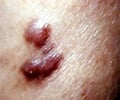
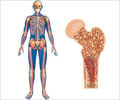
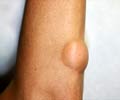
 Email
Email
